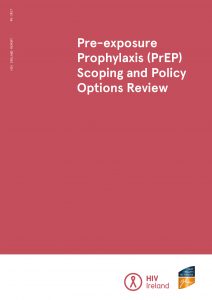HIV Ireland welcomes High Court Decision on HIV Disclosure
HIV Ireland welcomes High Court Decision on HIV Disclosure
High Court Refuses Permission to Child & Family Agency to Force Teenager to Disclose His HIV Status
Monday 12th March 2018
In an unprecedented situation for an Irish court, the High Court was recently tasked with deciding whether a Doctor can disclose the HIV status of a patient, without their consent, to another person who the doctor believes is having unprotected sex with the patient. The case, involving a teenager in care who has been living with HIV since birth, and another unnamed teenager, was brought by the Child & Family Agency.
The court concluded the extremely low possibility (0.04%) of HIV being transmitted in this case, and the fact that HIV is not a terminal illness, did not justify a breach of patient confidentiality, a cornerstone of the doctor/patient relationship.
Responding to the decision of the High Court, Mr. Niall Mulligan, Executive Director of HIV Ireland said, ‘We welcome this decision of the High Court not to force a teenager living with HIV to disclose his status against his will. HIV is a manageable, treatable illness. We know that people living with HIV, who are compliant with their treatment, and have an undetectable viral load cannot pass the virus on to someone else. The onus is on all of us to take responsibility for our own sexual health. We encourage everyone to use condoms, to avail of regular sexual health testing, and to be informed of the risks involved in having unprotected sex.’
Mr. Mulligan also pointed out the crucial importance in highlighting the need for policy makers, politicians, and the public to understand the impact HIV related stigma has on the lives of people living with HIV. Referencing HIV Irelands National HIV & Stigma Survey 2017, Mr. Mulligan stated:
‘When 17% of people living with HIV report having felt suicidal in 2017, it’s time to open our eyes to the damage that HIV related stigma is having on people’s lives. Among those living with HIV, the research found that a quarter are not comfortable with their own HIV positive status, over a half are single, and a third had experienced being rejected in a relationship due to their HIV status. Forcing someone to disclose they are living with HIV only perpetuates the stigma that currently exists in Ireland’.
For information about HIV, testing, safer sex and support please visit – www.hivireland.ie; www.man2man.ie; www.positivenow.ie
End
For further information, please contact:
Niall Mulligan,
Executive Director
HIV Ireland
70 Eccles Street
Dublin 7
Mobile: 085 7457951
Tel: 01 8733799
Email: niall.mulligan@hivireland.ie
www.hivireland.ie
HIV Ireland Information
HIV Ireland is a registered charity operating at local, National and European level. The principal aim of the organisation is to improve, through a range of support services, conditions for people living with HIV and AIDS and/or Hepatitis, their families and their caregivers while further promoting sexual health in the general population.
Our mission and vision is to contribute towards a significant reduction in the incidence and prevalence of HIV in Ireland and towards the realisation of an AIDS-free generation by advocating for individuals living with HIV, preventing new HIV infections and combating HIV-related stigma and discrimination.
Since 1987 HIV Ireland has been pioneering services in sexual health education and promotion, and has consistently engaged in lobbying and campaigning in the promotion of human rights. Our approach broadly reflects a harm minimisation model which emphasises practical rather than idealised goals. In relation to practical service provision we currently operate under two headings:
a) Community Support
• Counselling
• 1-1 Support
• Advocacy
• Community Outreach Work
• HIV & STI Community Testing
• Capacity Building with People Living with HIV
b) Prevention, Education & Training
• One day workshops on HIV, STI’s and Sexual Health
• Sexual Health Training for Trainers Programme (Let’s Talk About….Safer Sex)
• Free Condom Service (Just Carry One Campaign)
• Social Media work and campaigning
• Network Involvement

